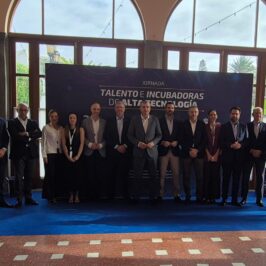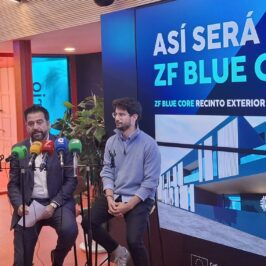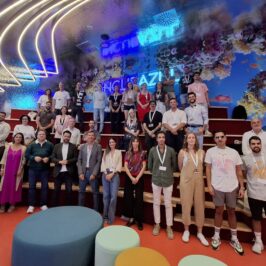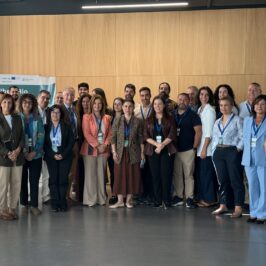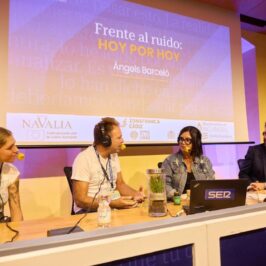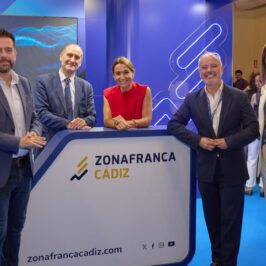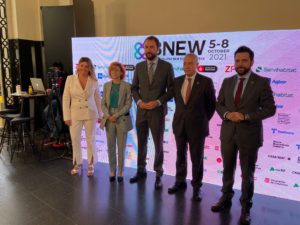
The State delegate, Fran González, attends the opening day of this international forum together with the delegates and representatives of the rest of the Spanish free zones
Subsequently, the deputy coordinator of the Incubazul technological incubator project, integrated in the Base Zone, participates in a monographic panel with representatives of the Network of High Technology Incubators of the INCYDE Foundation, of the Chambers of Commerce
The presence of the Free Zone at BNEW continues tomorrow in a panel on Economic Zones where the free zones of Spain will be present and where Fran González will delve into the main lines of business of the Cadiz Consortium
From today until next Friday, October 8, the BNEW brings together 11,000 companies to review, share and anticipate the trends that will change the production model
The opening day of the international event on the new economy "Barcelona New Economy Week (BNEW)" today saw the active participation of the Cádiz Free Trade Zone as the standard-bearer of the Blue Economy and of a new, more committed and responsible industrial model in the province of Cádiz, through, among other initiatives, its Incubazul technological incubator project, integrated into the Cádiz Base Zone project.
After the opening session, which was attended by the Special Delegate of the State, Fran González, together with the rest of the delegates and representatives of the free zones of Spain, the deputy coordinator of Incubazul, Jose David Sánchez de Medina, presented the experience of this incubator in a discussion forum on New Digital Industry entitled "High Technology Incubators: a reality in business support", a monographic panel on the network of High Technology incubators launched by the INCYDE Foundation of the Chambers of Trade with the support of FEDER Funds.
This forum has managed to establish a shared space for knowledge, exchange of experiences and promotion of these incubation tools that are proving to be fundamental for the transfer of R&D&I to companies.
With a dynamic participation that has allowed to know the specialization of each incubator, the debate channel has been moderated by Natalia Vázquez, director of ERDF Projects of the INCYDE Foundation and together with Sánchez de Medina as representative of Cádiz, Aintzane Arbide, director of the Barcelona 3D Incubator; Carlos Díaz, head of the Project Analysis Department of the Gran Canaria Economic Promotion Society; Santiago López-Guerra, Deputy Secretary General of the Vigo Free Zone and Juan José Sánchez, Councilor for Economic Promotion, Commerce and Markets of the Salamanca City Council.
In this scenario, in which each project has shown its advantages and potential in supporting talent and entrepreneurship, the deputy coordinator of Incubazul has explained how the Cádiz Free Trade Zone is launching a new greener and more sustainable industrial model, in in tune with the Agency 20-30 of the Government of Spain and with the Sustainable Development Goals (SDG) of the United Nations.
In this new model, the Blue Economy is a fundamental piece based on the fact that the Free Zone is completely integrated into the productive fabric of the province and its natural resources and, therefore, is linked to the enormous potential of the blue sector on the Cadiz coast, where the figures already place it as a “driving economy. For example, the Port of Algeciras generates 28,000 jobs and in Andalusia 10.5% of GDP comes from the Blue Economy. Because there are 6,600 boats in the fishing fleet that generate 13,000 jobs,” according to Sánchez de Medina. For this reason, the technological incubator will make it possible to create a pole around the Blue Economy that attracts investment and generates opportunities for entrepreneurship.
Sánchez de Medina has emphasized the special idiosyncrasy of the Cadiz incubator because it is committed to the circular economy and sustainability even from the very concept of the building that will house it, made up of recycled maritime containers. At this point, he has broken down with data that “we are building the free zone of the future, moving from a grayer and more carbonized industry, typical of 25-30 years ago, to one based on sustainability criteria. There are data that there are 300 million abandoned shipping containers with a useful life of between 10 and 15 years. Only the scrapping process to convert those 300 million into iron at 5,000 kg of CO2 per container, we are talking about the emission of 1,500 tons of C02. We are talking about twice what Germany emits in a whole year”, she remarked.
Finally, the Cadiz incubator model has also been highlighted, also committed to visualizing female entrepreneurship and promoting real equality. In fact, 70% of the initiatives that are already being incubated in Incubazul correspond to projects led by women.
The presence of the Free Trade Zone of Cádiz at the discussion tables will continue tomorrow with the participation of the delegate Fran González in the New Economic Zones channel, in which the delegates of Vigo, Barcelona and Gran Canaria will participate, among other representatives of Spanish free zones.




